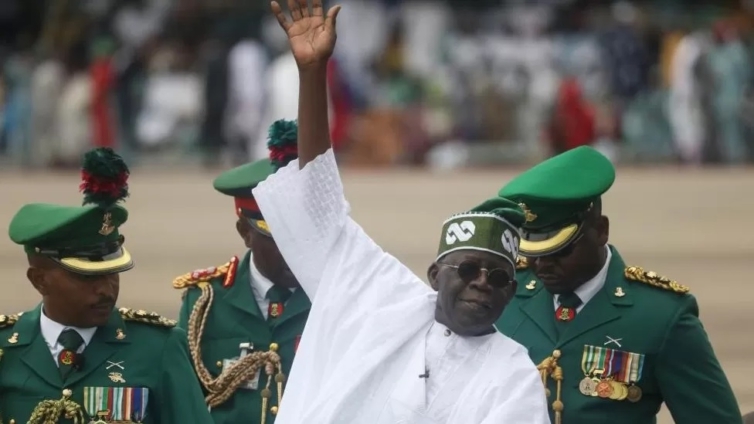The first full day in power of Nigeria's new president has seen people panic-buying fuel following his decision to scrap a decades-long subsidy on petroleum products.
In Monday's inaugural address, Bola Tinubu said the subsidy was "gone".
But he gave no timeframe or any more details of this major policy move.
On Tuesday, his team clarified that he meant the end of June and that the panic buying was "needless", as the policy will not take immediate effect.
President Tinubu wants to ease pressure on government finances, but ending the subsidy will increase the cost of petrol and hit other prices too, at a time when inflation is already high.
In response to his comments on Monday, many filling stations hiked the petrol price, while others stopped selling altogether.
Nigeria's state-owned oil company, the sole importer of petroleum products, assured the public that it had enough supplies.
But this did not prevent the panic-buying, with most people fearing a drastic rise in the price of petrol, which should be sold at the regulated price of 185 naira per litre (32p, 40c).
Some people have posted videos online of filling stations already increasing prices, in some cases by more than 200%.
Some drivers of private buses, which many Nigerians rely on to get around, have also been unable to fill up their vehicles.
This has left people stranded at major bus stops in the capital, Abuja, and the country's biggest city, Lagos.
Despite its oil wealth, Nigeria is unable to refine enough crude to meet local demands, so it imports petroleum products, which are then sold at a government-set price.
But the subsidy is a huge drain on public finances. Last year, it gulped 4.3trn naira ($9.3bn; £7.5bn) and for the first half of this year, 3.36trn naira was budgeted for it.
On Monday, Mr Tinubu said It could no longer be justified and that the funds would instead be spent on public infrastructure and to improve the lives of people.
But the subsidy has long been seen by many Nigerians as one of the few perks they receive from the state.
The last attempt to remove it in 2012 led to nationwide protests and then President Goodluck Jonathan had to perform a policy U-turn.
So far, a powerful association of those who sell petroleum products has come out to say it does not support President Tinubu's plan. It said the new government should begin a dialogue before taking the decision.
The spokesman of the Independent Petroleum Marketers Association of Nigeria, Ukadike Chinedu, is quoted by Nigeria's Punch newspaper as saying that the move will cause "galloping inflation and inflict more hardship on the masses".
Latest Stories
-
Prioritise integrity and professionalism – Mahama charges Police Council
14 minutes -
I pledge to lead Police Council with transparency, respect for rule of law – Prof Naana Jane
19 minutes -
A/R: Man nabbed for alleged impersonation of herbalist and defrauding
32 minutes -
From Survivor to Icon: Jamie Foxx owns the night at the BET Awards
46 minutes -
Legend of The Week – Teddy Osei
49 minutes -
Gov’t announces major data bundle increases across all networks from July 1
1 hour -
OSP carries out searches at SML offices in ongoing suspected corruption probe
1 hour -
Jobe Bellingham joins Dortmund for initial £27m
1 hour -
Two suspects arrested in Elmina for smuggling 250 bags of cocoa beans
2 hours -
Abuakwa South MP launches 4th edition of BECE support programme
2 hours -
Lives of Staff and students of GLISS threatened by ECOMOG slum dwellers over impending demolition
2 hours -
Ouattara slams Hearts fans over lack of support, urges loyalty to local clubs
2 hours -
Minority slams government over poor handling of nurses’ strike
2 hours -
EGL launches “Cedi Apicki Apicki” Promo to cushion consumers amid cedi appreciation
2 hours -
Photos: Interesting images for funeral of late Mamponghene Daasebre Osei Bonsu II
2 hours

